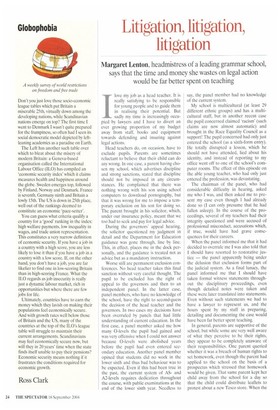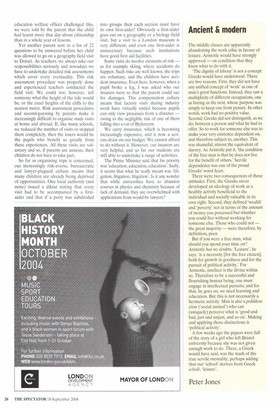Litigation, litigation, litigation
Margaret Lenton, headmistress of a leading grammar school, says that the time and money she wastes on legal action would be far better spent on teaching
Ilove my job as a head teacher. It is really satisfying to be responsible for young people and to guide them in realising their potential. But sadly my time is increasingly occupied by lawyers and I have to divert an ever growing proportion of my budget away from staff, books and equipment towards defending and insuring against legal actions.
Head teachers do, on occasion, have to exclude pupils. Parents are sometimes reluctant to believe that their child can do any wrong. In one case, a parent having chosen my school, which advertises discipline and strong sanctions, stated that discipline should not be imposed in any circumstances. He complained that there was nothing wrong with his son using school computers to download pornography, but that it was wrong for me to impose a temporary exclusion on his son for doing so. The parent brought in his solicitor, which, under our insurance policy, meant that we too had to seek and pay for legal advice.
During the governors' appeal hearing, the solicitor questioned my judgment in detail and the Department for Education guidance was gone through, line by line. This, in effect, places me in the dock personally, and the guidance is treated not as advice but as a mandatory instruction.
Worse still are permanent exclusion conferences. No head teacher takes this final sanction without very careful thought. The pupil to be excluded has the right of appeal to the governors and then to an independent panel. In the latter case, panel members, who have no knowledge of the school, have the right to second-guess the decision of the head teacher and the governors. In two cases my decisions have been overruled by panels that had little understanding of current education. In the first case, a panel member asked me how many 0-levels the pupil had gained and was very offensive when I could not answer because 0-levels were abolished years before the pupil had even entered secondary education. Another panel member opined that students did no work in the lower sixth and thus bad behaviour was to be expected. Even if this had been true in the past, the current system of ASand A2-levels requires dedication throughout the course, with public examinations at the end of the lower sixth year. Needless to say, the panel member had no knowledge of the current system.
My school is multicultural (at least 29 different ethnic groups) and has a multicultural staff, but in another recent case the pupil concerned claimed 'racism' (such claims are now almost automatic) and brought in the Race Equality Council as a support! The pupil concerned had only just entered the school (as a sixth-form entry). He totally disrupted a lesson, which he should not have attended, lied about his identity, and instead of reporting to my office went off to one of the school's computer rooms. The effect of this episode on the able young teacher, who had only just entered the profession, was devastating.
The chairman of the panel, who had considerable difficulty in hearing, asked me who I was, and then asked me to present my case even though I had already done so (I can only presume that he had fallen asleep). In the course of the proceedings, several of my teachers had their integrity questioned and were accused of professional misconduct, accusations which, if true, would have had grave consequences for their careers.
When the panel informed me that it had decided to overrule me I was also told that I should have resorted to restorative justice — the panel apparently being under the delusion that exclusion forms part of the judicial system. As a final lunacy, the panel informed me that I should have taken formal witness statements throughout the disciplinary proceedings, even though detailed notes were taken and these were later translated into statements. Even without such statements we had to have a lawyer to represent us, and the hours spent by my staff in preparing, detailing and documenting the case would have been far better spent teaching.
In general, parents are supportive of the school, but while some are very well aware of what they perceive to be their rights, they appear to be completely unaware of their responsibilities. One parent queried whether it was a breach of human rights to set homework, even though the parent had applied to the school on the basis of a prospectus which stressed that homework would be given. That same parent kept her child away from the school for a day so that the child could distribute leaflets to protest about a new Tesco store. When the education welfare officer challenged this, we were told by the parent that the child had learnt more that day about citizenship than in a whole year of lessons.
Yet another parent sent in a list of 22 questions to be answered before her child was allowed to go on a geography field visit to Dorset. As teachers, we always take our responsibilities seriously and nowadays we have to undertake detailed risk assessments which cover every eventuality. This risk assessment procedure was properly done and experienced teachers conducted the field visit. We could not, however, tell someone what the height of the tide would be, or the exact heights of the cliffs to the nearest metre. Risk assessment procedures and second-guessing by parents make it increasingly difficult to organise study visits at home and abroad. If, like many schools, we reduced the number of visits or stopped them completely, then the losers would be the pupils who benefit so greatly from these experiences. All these visits are voluntary and so, if parents are anxious, their children do not have to take part.
So far as organising trips is concerned, our increasingly risk-averse, bureaucratic and lawyer-plagued culture means that many children are already being deprived of opportunities. One local authority (not mine) issued a diktat stating that every visit had to be accompanied by a firstaider and that if a party was subdivided into groups then each section must have its own first-aider! Obviously a first-aider goes out on a geography or a biology field visit, but a visit to a London museum is very different, and even one first-aider is unnecessary because such institutions have good first aid facilities.
Some visits do involve elements of risk — as for example skiing, where accidents do happen. Such risks are well known, the trips are voluntary, and the children have accident insurance. Even here, however, when a pupil broke a leg, I was asked who our insurers were so that the parent could sue for damages. This compensation culture means that factory visits during industry week have virtually ended because pupils can only view processes from a distance — owing to the negligible risk of one of them falling into a vat of Brylcreem.
We carry insurance, which is becoming increasingly expensive, and is now a serious drain on our budget. We cannot afford to do without it. However, our insurers are very helpful, and so far our students are still able to undertake a range of activities.
The Prime Minister said that his priority was 'education, education, education'. Sadly, it seems that what he really meant was 'litigation, litigation, litigation'. Is it any wonder that while universities have to abandon courses in physics and chemistry because of lack of demand, they are overwhelmed with applications from would-be lawyers?



















































































 Previous page
Previous page